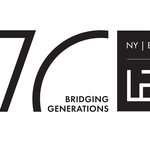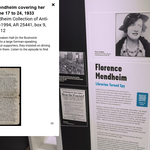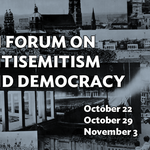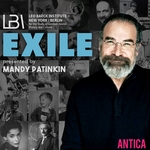Martha Minow urges us to “resist tyranny and revenge”


- Datum
- Di., 26. Nov. 2019
On November 19, 2019, Martha Minow, 300th Anniversary University Professor at Harvard Law School, was presented with the Leo Baeck Medal by LBI President Ronald B. Sobel. After laudatory remarks by Sobel, German Ambassador to the US Emily Haber, and LBI Trustee Robert S. Rifkind, Minow gave the following remarks.
“Today’s leaders in Hungary, Poland, Venezuela, the Philippines, and Turkey are individuals who appeal to the fears and hatreds of masses of people—at the expense of minorities, truth, reason, and fundamental values of equality, tolerance and the rule of law,” said Minow.
“The problem is not a handful of demagogues,” she continued. “Every age produces them. The problem is the discontent of millions of people, facing economic instability, climate insecurity, mass migrations, technological change, cultural shifts around gender and race—people who in turn seem all too willing to embrace the politics of fear and blame.”
Minow cited Leo Baeck’s universalist ethics rooted in reason as the antidote to this crisis and called on us to resist the temptations of silence. “To live up to this ideal, we each need to act with vigilance in the face of bigotry and resist the destruction of the laws, norms, and institutions of democracy and fairness.” Rather than bystanders, said Minow, we should strive to be “upstanders”—who speak out against violence and bigotry, expose wrongdoing as whistle-blowers, or support victims of oppression.
Remarks by Martha Minow
When Hannah Arendt, Martin Buber, Gershom Scholem and others founded this Institute to preserve the history of German-Jewish culture, they acted with resolution and hope—qualities much needed right now. How meaningful that they named this effort, this Institute, for Leo Baeck—who served as its inaugural leader.
What an honor it is to receive this award, especially from this place, at this time.
Baeck advanced universal ethics rooted in Western ideals of reason, exemplified by Plato and Kant, AND in the Jewish idea that each person can choose between right and wrong. He was a leading German-Jewish thinker, a leading Jewish intellectual, and a leading German theologian. He provided community leadership in dark times. At the concentration camp Theresienstadt (Terezín), he defied the circumstances and taught classics of Western humanism. And when the camp was liberated, he urged legal justice rather than violent vengeance.
Baeck’s belief in reason and morality seems almost impossible to maintain during his time—and maybe also in our time. Do you, like me, look now at German-Jewish history and see disturbing parallels between the 1930s and this time?
Today’s leaders in Hungary, Poland, Venezuela, the Philippines, and Turkey are individuals who appeal to the fears and hatreds of masses of people—at the expense of minorities, truth, reason, and fundamental values of equality, tolerance and the rule of law. Disdaining human rights, justifying oppression in the name of national security, manipulating mass media and elections, demonizing critics, spreading corruption—these are the elements identified by Yale professor Timothy Snyder in his historical lessons on tyranny.[1]
Look to the 1920s and 30s, says Snyder, when too many people celebrated fascism and violence over reason and law; when Germany elevated a leader who claimed to have a mystical connection to his people; and when so many treated internationalism as a conspiracy rather than a set of problems.[2] There are eerie parallels from that period’s Hitler and Mussolini with Orban in Hungary and Duda in Poland today. Netanyahu and Trump make similar claims that only they can save their nations. According to court filings by his ex-wife, Trump used to keep by his bed Adolf Hitler’s pre-World War II speeches and drew these lessons: blame others, attack immigrants, foment social divisions, and demonize any source of authority other than himself.[3]
The problem is not a handful of demagogues. Every age produces them. The problem is the discontent of millions of people, facing economic instability, climate insecurity, mass migrations, technological change, cultural shifts around gender and race—people who in turn seem all too willing to embrace the politics of fear and blame. So, the time is ripe for unscrupulous demagogues who urge people to throw out reason, law, fairness, truth, and memory. Unfortunately, increasingly relevant is Hannah Arendt’s vital reminder: “Totalitarianism appeals to the very dangerous emotional needs of people who live in complete isolation and in fear of one another.”[4]
When white supremacists gathered in 2017 to oppose removal of a Confederate statute in Charlottesville, Virginia, they did not simply kill one person and injure 19 others. They projected on a global platform people and groups identifying as alt-right, neo-Confederate, neo-fascist, white nationalist, neo-Nazi, Ku Klux Klan, and anti-Muslim and antisemitic. They chanted racist and antisemitic slogans and carried Nazi and Confederate symbols. Pressed to respond, President Trump condemned hatred but also said there was blame “on both sides.”
Amplifying such incidents are digital communications eliminating speed-bumps in the circulation of lies and hatred, and allowing once-isolated and venomous individuals to communicate, mobilize, and recruit. YouTube hosts hateful videos geared effectively to young white boys—and, as Joanna Schroeder explained last month in the New York Times, “Recommended videos and comments left on YouTube can lead [young boys] to threads full of racism and conspiracy theories…Google may lead them to white nationalist outlets like The Daily Stormer, where hate and harassment are normalized.”[5]
Using anonymity and the audacity of crowds, new communication technologies permit and spread demeaning, abusive, and hateful messages. Some propelling these posts are spurred by the promise of money tied to the eyeballs of viewers who engage in electronic rubber-necking or dare-you-to-be-outrageous games.[6] Sometimes the abuse is a response to perceived slights or wrongs, reflecting the escalation of tit-for-tat abusiveness.[7]
Digital media circulate conspiracy theories and lies. Perhaps this is why one-third of American now do not believe that 6 million Jews were murdered during the Holocaust.[8] And particularly toxic contemporary development is the easy access to highly lethal guns—so mass shootings by people experiencing rage killed more than 70 people in the United States this year, and hundreds others killed rage and guns elsewhere in recent years.[9]
“It’s like living in Germany in the 1930s,” I said a few days ago to a friend who sharply disagreed. “I was living in Germany in the 1930s,” she said, and “this is very different. It’s bad, but now, there is strong resistance.” There are indeed important signs of resistance:
Municipal elections recently pushed back against the growing authoritarianism of Viktor Orban in Hungary.[10] The German government’s response following the killing of two people by a synagogue on Yom Kippur shows concrete resistance.[11] For several years, the European Union did nothing while Hungary’s government stripped the constitutional court of independence, curbed civil liberties, took over media, and ousted a liberal university. But in June of this year the European Court halted a similar attempted assault on the independence of Poland’s Supreme Court in contravention of European law.[12]
Here in the United States, despite multiple threats to democracy, freedom, and law, the nonprofit Freedom House recently found that 84% of Americans, across party lines, still believe in the importance of democracy, free expression, fair and transparent elections, and equal rights and protections for all—and still want to safeguard our system and secure American’s role as an exemplar of democracy and freedom.[13]
An exemplar perhaps more in theory than in constant practice, the United States has at times lived up to ideals of democracy and freedom. In 1790, President George Washington memorably wrote the Jewish community and others gathered at the Touro synagogue in Rhode Island: “happily the Government of the United States gives to bigotry no sanction, to persecution no assistance.” Thus, the first president of the United States stressed that the liberty and immunities of Citizenship apply to members of the Jewish community not due to the generosity of others, but as a matter of right ensured to all.[14]
To live up to this ideal, we each need to act with vigilance in the face of bigotry and resist the destruction of the laws, norms, and institutions of democracy and fairness. We need to not be “bystanders,” a person who is near but does not take part in what is happening. Isn’t it telling that we have lacked a word, at least in English, for its opposite?
Actually, a new word has been invented. “Upstander” is the word; it does not yet seem to have translations in other languages. I first heard it from Samantha Power, at the time a human rights advocate and scholar, before she assumed—until January 2017—the role of US Ambassador to the United Nations.[15] An “upstander” stands up against bullying and oppression. As John Adams says, “always stand on principle…even if you stand alone.”[16] Two students petitioned the Oxford English Dictionary to include the word.[17] By naming it, the concept can become a practice. In the United States, human rights advocates and campaigns against domestic violence and bullying children embrace the word.[18]
An upstander may speak out publicly against bigotry and injustice. Or an upstander may remain anonymous as a whistle-blower, exposing wrongdoing in the hope of stopping it—and using legal protections against harassment or retribution. As Justice Louis D. Brandeis said, “The greatest menace to freedom is an inert people.” An upstander resists the temptations of silence and supports victims of bigotry and violence.
Over 24,000 individuals assisted Jews during the Second World War. Whether speaking out publicly or instead engaging in secret resistance, upstanders face danger. The danger may be disapproval by others; costs of time, money, and emotion; or even more dire risks to personal safety. And it is of course easier to be passive, to feel overwhelmed, fearful, or to deny the risks to us all from the abuse leveled against others. Albert Einstein, speaking as a German refugee as well as theoretical physicist, said: “The world is not dangerous because of those who do harm. It’s dangerous because of those who watch and do nothing.”
To be an upstander may seem daunting especially if it implies solo, heroic action. So, we need to build practices to help us resist peer pressure to do nothing and to strengthen peer support for standing up against suffering and injustice. That includes demanding that our leaders do the same. We must address fears, denial, and bewilderment so often experienced by those who do nothing in the face of oppression. Standing up includes “liking” and praising those who stand up; it can include shunning those who engage in hate.
Upstanders are not only remarkable individual heroes but also responsible communities, resisting the assumption that these are other people’s problems. Passivity should be no easier than taking action against hatred and violence. Our networks, cultures, and institutions should help individuals empathize with those who are oppressed. Pick your targets of abuse: there are more than enough to go around.
Eboo Patel, an American Muslim, powerfully wrote, “Registering your story in the narrative of American discrimination offers opportunities for commiseration, but more importantly, it gives your community a dramatically expanded set of responsibilities. […] You quickly realize that other people’s struggles have secured your rights.” We each secure the rights of others. That’s how rights work. As Walt Whitman wrote, “Whoever degrades another degrades me’.[19]
During America’s shameful World War II internment of Japanese-American citizens and Japanese residents based on trumped-up claims of disloyalty, a small group of college and university presidents opened their doors to internees. I have been thinking about what to do if the US Supreme Court removes legal protection for the “Dreamers,” young immigrants residing in the US after their parents brought them here without lawful approval. They were granted legal protection by the Obama administration, and they are now being turned into political pawns or else facing deportation. Several of my students are Dreamers—talented, aspiring, committed to the values of this country—which is the only nation they have ever known. Do I hide them in my house?
To fight tyranny[20] we defend legal and educational institutions, watch the paramilitary, believe in truth, investigate, retweet only what is reliable, be as courageous as we can, resist politics of inevitability and pessimism, and remember those who came before and suffered but nonetheless did more than we do.[21] And we pick and stand with friends and leaders who stand for human decency, freedom, and accountability.
A watchword for our time should be Hannah Arendt’s caution: she said, “The sad truth of the matter is that most evil is done by people who never made up their minds to be or do either evil or good.”[22] Finding a silver lining in difficult situations, Leo Baeck once observed, “A minority is always compelled to think.” He observed that successful majorities in power do not need to pay attention nor struggle for awareness.[23] He held onto reason and ideals. At the moment his concentration camp was liberated, Baeck –who had been scheduled for execution—urged his fellow inmates not to kill their guards but rather to hand them over to the Russians. Resist tyranny and revenge, aspire to the best, and resist the worst in human experience. Even in our righteous work, we must not become what we hate. These are legacies of Leo Baeck for our time.
Thank you for the honor of being here with all of you.
References
[1] Timothy Snyder, The Road to Unfreedom: Russia, Europe, America (2018).
[2] Id., at 16.
[3] Steven Rosenfeld, Leading Civil Rights Lawyer Shows 20 Ways Trump Is Copying Hitler’s Early Rhetoric and Policies, Common Dreams ( August 09, 2019); (describing Bert Neuborne, When At Times a Mob is Swayed: A Citizen’s Guide to Defending Our Republic (2019)).
[4]Hannah Arendt, from an Interview, New York Review of Books (Oct. 26, 1978).
[5] Joanna Schroder, “Racists Are Recruiting. Watch Your White Sons”, New York Times (Oct. 12, 2019). See Alice Marwick and Rebecca Lewis, Media Manipulation and Disinformation Online, Data and Society Institute (May 15, 2017),.
[6] See Jon Russell, “YouTube Bans Hateful Videos From Making Money Via Its Advertising Network”, June 1, 2017.
[7] Emily Bazelon recently asked in the New York Times, “How Do We Contend with Trump’s Defiance of ‘Norms'?” New York Times, (July 11, 2017), and Wesley Morris shortly thereafter wrote about the “Guilt Free” unapologetic spirit animating both right-wing rants and racial justice resistance. See Wesley Morris, “Guilt Free”, New York Times, (July 30, 2017).
[8] David Brennan, “One Third of Americans Don’t Believe 6 Million Jews Were Murdered During the Holocaust”, Newsweek (April 22, 2018).
[9] Alejandro de la Garza, “69 People Have Been Killed in Mass Shootings in 2019 Alone”, Time (Aug 5, 2019).
[10] Miklos Haraszt, “How the spirit of 1989 sustains the Hungarian opposition’s fight against Viktor Orban”, Washington Post (Nov. 8, 2019).
[11] “Germany's Jewish leaders condemn police response to Halle attack”, The Guardian (Oct. 10, 2019); Cnaan Lipshiz, “How Germany is rethinking security for its Jewish community following the Yom Kippur synagogue attack”, Jewish Telegraph Agency (Oct 18, 2019).
[12] James Shotter, “EU Orders Poland to Halt Overhaul of Supreme Court”, Financial Times (Oct. 29, 2019).
[13] See Freedom House, Democracy in Retreat (2019), https://freedomhouse.org/report/freedom-world/freedom-world-2019/democracy-in-retreat.
[14] Id. See also Jonathan D. Sarna, “George Washington’s Correspondence with the Jews of Newport”, in Adam Strom, Dan Eshet, and Michael Feldberg, eds., Washington’s Rebuke to Bigotry: Reflections on Our First President’s Famous 1790 Letter to the Hebrew Congregation in Newport, Rhode Island 73, 76 (Facing History and Ourselves 2015).
[15] Samantha Power, “Bystanders to Genocide”, The Atlantic, (Sept. 1, 2001), See also Sheryl Jackson, The Rise of the Upstander.
[16] Other words identify overlapping concepts. For example, “activist” identifies advocates for a cause; heroes display courage in the face of adversity; whistle-blowers expose secret misconduct; rescuers come to the aid of individuals in danger. None of these words though specifically identifies rejecting the temptations of silently observing oppression and maltreatment of others.
[17] See New Jersey Students Petition to Add “Upstander” to Oxford English Dictionary, Facing History and Ourselves (Nov. 11, 2014), (“Two Facing History and Ourselves alumnae Monica Mahal and Sarah Decker are petitioning the Oxford University Press to add the word “upstander” to its English dictionary. The word “upstander” is a term frequently used in Facing History resources and classrooms to describe people that take action on behalf of others—the opposite of the more commonly-used bystander, which is included in the dictionary.”).
[18] On domestic violence, see Mayor’s Fund to Advance New York City, (last visited Jan. 1, 2015) (“We all play a role in combating intimate partner violence, and New York City is launching a campaign to ensure that no one is a bystander. The City of New York, the Office to Combat Domestic Violence (OCDV) and New Yorkers from all five boroughs are teaming up to put an end to intimate partner violence. Join them in being an #UpStander.”). On anti-bullying, see 10 Ways to Be an Upstander, BullyBust, Promoting a Community of Upstanders (last visited Jan. 1, 2015); Cheryl Jackson, The Rise of the Upstander, Bullying Epidemic: Make Every Day Bullying Prevention Day (July 26, 2013). Holocaust education groups have started using the term. See, e.g., Upstanders, Holocaust Memorial Education & Resource Center of Florida, (last visited Jan. 1, 2015).
[19] Eboo Patel, “The Most American Thing You Can Do”, in Adam Strom, Dan Eshet, and Michael Feldberg, eds., Washington’s Rebuke to Bigotry: Reflections on Our First President’s Famous 1790 Letter to the Hebrew Congregation in Newport, Rhode Island 199, 210 (Facing History and Ourselves 2015).
[20] Timothy Snyder, On Tyranny: Twenty Lessons from the Twentieth Century (2017).
[21] Id., at 125.
[22] Hannah Arendt, The Life of the Mind (1978), “Thinking”.
[23] Leo Baeck, The Essence of Judaism (1905).
Aktuelles





